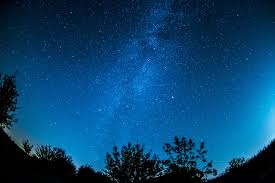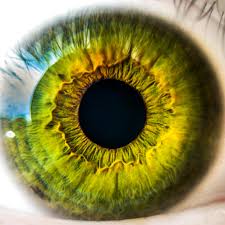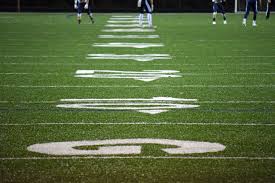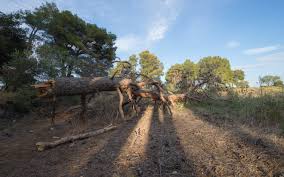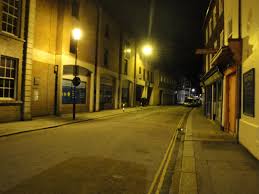How could it have been worse? Not only the three-hour drive, mostly into the setting sun, and their wooden conversation, mostly about nothing, but in the last half mile of forest, just before they finally got to the cabin, a tree lay fallen across their road.
David had watched the tree for a few years, a hackberry. He watched it die limb by limb and drop branches slowly, watched it shed bark in sheets, watched new pileated woodpecker holes appear in the bare white trunk, watched the tree and wondered if it might do exactly what it had finally done.
Had watched and done nothing because this was the natural course. A snag like this served its own purposes in the forest. After it had dropped its leaves for the last time, it became a home to furred and feathered cavity nesters taking their turn. It allowed sunlight to return to the forest floor. And then finally, when it came down, it began to merge with the ground again, returning its decades of enrichment to the soil. To David, a fallen tree wasn’t bad it was just, well, next.
Curt saw none of this however. To his green eyes the fallen tree was a roadblock, a new chore to hijack their weekend, a bad start to a difficult visit that needed to be a good one or else everything would be wrong for all time.
David shut off the truck’s engine, and both of them stepped out at the same time. The tree was a blowdown, its withered roots heaved from the ground and coated with the rocky Ozark soil the trunk had risen from, the hole it left behind still holding water from the storm that had toppled it. His father had once said – had he said it, Curt wondered, or was it just a story he liked to believe? – that it would be among the roots of such a fallen tree that he could ever hope to find an arrowhead, and Curt scrutinized the rocks there, looking for a worked stone lost by a hunter centuries before and then entwined in the roots of a sapling begun as an acorn or nut that had fallen beside it. He wasn’t sure what kind of tree it had been, but his father would know.
“A snag like this could have stood for another twenty years or fallen in a day,” David said. “Our tough luck that it came down now and across the road.”
“Must have made a lot of noise when it fell.” Curt paused, waiting for a response that didn’t come. Then, “I guess we need to walk the rest of the way to the cabin and bring back the chainsaws.”
“Maybe not.” David broke off a branch as thick as Curt’s arm and tossed it aside. “C’mon.” He returned to the truck, and Curt followed. David shifted the truck into four-wheel drive and steered into the trees, picking his way, pushing down or pushing aside the scrub and saplings, bumping over rocks hidden in the damp leaf litter, finding a path through all of it that would fit his truck and get the two of them past the problem and back on the gravel road that lead to the family cabin. Branches scraped the side of the truck, stuttered across the roof of the cab, slapped the windshield and plucked the antenna. But David did not relent, and as they crept, Curt watched in silence as his father found a way that was invisible to him. When they bumped onto the road once again, David didn’t pause to relish his success but stepped on the gas and continued to the cabin.
The cabin waited, waited to welcome them, waited as it had for decades past and would, they all hoped, for decades more, its own roots sunk deep in the Ozark hardpan. For David the cabin was the most evocative memory he had of his father, who had built it; for Curt the feeling was more diffuse. It was family and memory and stories and a sanctuary that would always be ready, both safe and sacred. As it needed to be most of all for him, for them, this weekend. All that was wrong could seem right, seem fixable, when he was at the cabin.
The fallen snag, they both knew unspoken, would wait for the next day. They would return rested, with the tools they needed and when the day was fresh. An hour or two of harsh noise and heavy lifting, then the road would be clear again, showing remnants of the fall and their clean up, but all of that would soon be absorbed by the living forest that would keep to its eternal cycles. Before them now, though, was the work of getting settled in the cabin and a fire built before the summer sun had set. Chores practiced through the years, both together and alone, that were simple to Curt. Simple and clear compared to his real, his dreaded task for their weekend. This complicated and conflicted son of a good but possibly not good enough father. He would soon know.
“Talk to your father,” Kathy told him. She had watched her boy in the days and weeks following his graduation from medical school, saw how the completion of this one great thing had now meant that another, greater thing took its turn and lay before him, no longer to be shunted and put off. “Say what you need to say to him,” she said as the two of them sat at the kitchen table and picked at the threads of Curt’s next life. Kathy knowing, without having been told, what her son needed to tell his father, and also knowing, better than her son could, what his father would say in response.
“Do you think maybe you underestimate him?” Kelly had said, his turn to press counsel on Curt, unasked but not, he knew, unwelcome. “Has he ever given you any sign that he is not broad-minded? Or at least incapable of being so?” Kelly knew, guessed, with an objectivity Curt did not have, that the picture Curt had painted of his father was incomplete, even unfair, and further, suspected that this most important conversation of their two lives would finally breach that false barrier, and Curt could begin to see the depth in his father that he hadn’t allowed himself to across most of his life.
And so here he was, in the place that was refuge for both of them. Where, Curt knew, he had always felt most clearly the love of his father, a man who was not so good with words but who had an eloquence of both action and stillness that better expressed his heart. But if his love was unspoken it was also, Curt believed, unguarded. As natural and boundless as the blue summer sky above them. All that remained was for Curt to say three small words. But his life would not be the same after he spoke them. Nor would his father’s. And he cared deeply about both. So, Curt asked himself as he built the fire he would certainly light with a single match, should he upend their entire weekend at the cabin, or wait for the last possible moment so he, they, could relish most of this time they had together just as they had countless weekends of their past?
Yet if Kelly was right, then so many of those uncounted visits – most of Curt’s life as a son really – had been incomplete, not as fully or as deeply lived as they should have been. If Kelly was right, then Curt had cheated his father and had cheated himself. And if his mother was right – there was no question of this to Curt – then he shouldn’t wait a moment longer.
Still, nothing would be the same afterward. Who would think that it could? Each moment of each day for the rest of their lives would be filtered through this new knowledge. And it was this aftermath that Curt feared the most. Even the best outcome would mean a subtle but permanent difference in how they saw one another.
Curt’s fire burned brightly, pushing back the falling darkness, and he readied the larger pieces of wood to add so they would have flickering flames and coals for conversation and quiet musing. He wondered how many of these fires he had built in his life and wished he had kept some record of it, some record beyond the deep build up of mute ash in the ring. David came from the cabin with two beers in hand, giving one to Curt, and they both popped them open. The night sounds of the forest were beginning. A barred owl had been calling across the lake below them, and they hoped, as they always did, to hear a whippoorwill, their totem sound and one David had commented that he’d seemed to hear less frequently than he had in his boyhood memories. Even with the regular cycles of the forest, some things changed. This simple, even pure delight of theirs might go missing some day, and he was glad Curt had known of it, had experienced it.
“Doctor Clark! It’s easy to be proud of you, Curt.”
Stop, Curt thought. You’re making this harder. He dropped a chunk of split oak onto his fire. Orange sparks spiraled into the air and winked out.
“Maybe so,” Curt said. “But maybe med school was the easy part. Being a doctor, a resident in the real world might not be so easy.”
David pulled a chair closer to the fire; its feet ground through the gravel. He sat, and in a moment, Curt did the same, across the fire from his father. Once on an evening much like this, a screech owl had pierced the forest with its call. Sudden silence had followed; every other creature had ceased its noise in awe or terror. Curt remembered that.
On this night they were instead gifted with the three notes of a whippoorwill, somewhere in a tree beyond the firelight. Both men sat in silence, savoring the sound, and Curt recalled another now long-ago time when he had tried to count the repetitions of the bird’s call, giving up somewhere in the thirties.
The whippoorwill had spoken. Curt would as well.
“Dad,” Curt said, not lifting his eyes from the orange glow of the consuming flames between them, and David knew from Curt’s use of that word, this less formal name for him he rarely used, that important words were about to come, words he thought he could guess.
He tried again. “Dad, I’m gay.”
And now the aftermath.
Curt did not know how long his father had been waiting to hear these three small and so hugely complex words from his boy. Curt had always been a clever boy. The depth of his compassion had led him down the path to becoming a doctor. But for all of the range in his heart and mind, Curt had never seemed able, or perhaps willing, to grant sufficient humanity to his own father. Early on he had formed a concept of who the man was, what his essential nature was, and he had been so busy hiding his own essential nature, that he missed all of the evidence that David Clark was the one person on the whole planet who loved him most of all.
David hadn’t understood, at first, why his son had cultivated an uncrossable distance between them. They could joke and laugh and discuss most things and even skinny dip in the lake together without hesitation, but he knew there was always something in the way. As his realization of what this must be slowly came to him, and he stopped joking about girlfriends and stopped speaking about grandchildren, he understood that if it ever were to be broached, it would have to be on Curt’s terms. His boy grew, never giving him a single moment of rebellion or cause for grief that he could remember. He finished high school well. He went to college and came back a man of insight and achievement. Then he went to medical school and came back a doctor. And yet during all of this, Curt had not found the opportunity – or was it maybe the desire? – to be fully open with him.
David never knew why, just as he didn’t know why this time, this visit to their cabin, was when it had finally happened. What about the universe had changed?
And then it struck him. He pulled on his beer then cleared his throat, wanting to say the right thing and not realizing how even the short time the took for this reflection was rending Curt’s heart, filling him with a certain fear of an outcome that he had been equally certain wouldn’t come.
“So is there someone special?” David asked, not yet ready to meet his son’s eyes. He would follow Curt’s lead in the moments ahead.
Curt slumped into the most immense relief he had felt in his life. David’s question told him that his father, whose opinion most counted in all the world, had jumped past objection or rejection or confusion or whatever wrong might have been, had even jumped past immediate acceptance, and had effortlessly moved on to opening his heart to Curt’s fuller life. Someone special! Someone his father would greet and hug and welcome as a second son and bring to the cabin and their forest because this was his way of expressing love.
The part of Curt that had known this all along pushed aside his unfounded fears, sidestepped the more obvious subject for discussion, and joined his father on the other side.
“Yes, actually. His name is Kelly.” Then a moment later, “I met him on the running trail.”
“A runner like you! That’s great.”
“Yeah,” he said, barely able to suppress a chuckle of giddiness.
David was about to ask when he would get to meet this Kelly person, this person who loved his son, but another thought pressed itself ahead.
“I don’t suppose you even need to tell Mom.”
“She can see right through me, Dad!”
“I know. Me too.” And he’d heard that word “Dad” again. “Still, you should tell her anyway. Just to get it in the open.”
Maybe they were exhausted by their achievement because they let a comfortable silence fall between then, filled, mercifully, by the chirring forest around them. Each man had been unprepared for the other’s words but each man had been relieved and released by them. David finally attempted.
“Curt.” He scuffed the toe of his boot in the gravel. “I’m not very good with these things. With speaking my mind. I don’t know the right things to say, the right way to say them. All I can say is that I love you. I always have. I always will. You’re my perfect boy and I’ve always been proud of you.” He paused and set his beer on the gravel then clasped his hands. “I don’t know what else to say, son.”
In a husky voice Curt said, “You don’t have to say anything else. What you said is perfect.” And then, “Thanks, Dad.”
And so for a while neither of them said anything. The fire between them snapped and sizzled. The insects and frogs sang in the trees. Faraway owls hooted. A breeze came from the other side of the cabin and blew smoke into Curt’s face. He closed his eyes for a moment, but when he opened them again, the smoke was still coming at him.
“Well, if that’s they way it’s going to be,” he said, rising from his chair and dragging it through the gravel to the other side of the fire beside his father. His dad. Dad.
In the orange of the firelight David reached across and rested his hand on Curt’s bare forearm.
“You know what I don’t see a lot of out here?”
Curt, not expecting to be confronted with such an odd question and unable to imagine where it might lead said simply, “What’s that?”
“Mosquitos. I guess the dragonflies and the bats take care of that for us.”
What could he say in response to that? Curt wondered. Was any response necessary? His father had eased right back into common cabin conversation, into the mundane they shared as though Curt’s monumental words were now well behind them and maybe even not so monumental at all. More importantly though, when, beyond a perfunctory handshake or a clap on the shoulder, was the last time his father had touched him, touched his skin? When had he let him? His arm tingled.
They both knew, each at his own level, that what had passed between them at this campfire would need more thought, more slow absorption into their lives. That their few words to each other would eventually be followed by other words, mostly good words surely, but words that would pick and poke at their changed relationship, furthering it, deepening it, and discovering what it would mean going forward.
David was already beginning to sense this. Now that he had his son back – and he was back, wasn’t he? After more than a decade of holding himself at his distance Curt had finally spoken his truth and together they had pushed aside or left behind what had been between them, right? – David realized that he was also losing him. Soon he would no longer have Curt to himself, at least as wholly to himself as he might have before and now could only for the rest of their weekend while they were together in this place. Because Curt was going to give himself to another. To Kelly. David would have to learn to share him, to accept – once again, ironically – whatever bits of Curt were allowed to him. He held this bittersweet tension in his heart, feeling it but not understanding it.
Curt, in turn, tried to find his own new equilibrium. It wasn’t so much that his father’s automatic acceptance of his son’s life had been unexpected. He realized how he should have seen this, should have seen it years before. No, it was that so much time had been wasted, so much love had been tempered, so much chill had been cultivated and then endured. So much needless waste! Why had he allowed himself to create such a mess? To let it last for so long? His diagnosis: he hadn’t been a very good son to a very good father. No, he had not been very good; merely good enough. Never mind that the cure had come easily or that they could both now be healthy again. That the affliction had existed at all was his real shame.
The whippoorwill had ceased its call. David thought he had heard one across the lake, up on the far ridge, but it was too distant to hear clearly. The air had stilled. A thread of smoke rose unmolested from the few coals still glowing in the ring. Time to spread them so they could burn out. Maybe quench them with whatever liquids the two men had at hand. And then to the cabin for the night. The usual routines before going to sleep.
David screwed his half empty beer can into the gravel and pushed up from his chair. He prodded the coals with a stick and considered whether they needed further attention or could burn themselves out overnight. The recent rain meant the forest was wet, so he wasn’t too worried, but he also knew he would rise in the night, more than once likely, and he could check on the coals then.
Curt had watched in silence, thinking much of the same thoughts as his father, the result of having shared countless campfires with him in this place.
David said, “I’m turning in.”
“Be right there,” Curt said, rising from his chair and stepping closer to the coals. “One thing first.”
As David walked the familiar path to the cabin he heard Curt quenching the coals.
When Curt reached the cabin, David had already turned on the lantern that hung from a hook in the ceiling. The light was dazzling to his dark-adapted eyes and he looked to the floor at first as David opened the windows to ensure that whatever breeze passed before the cabin would also pass through it and keep them cool as they slept.
And it was in this moment that Curt was overcome with the realization of how fully his three words had changed his life.
Before him his father was undressing, getting ready for falling into bed. He would strip to his briefs, unabashedly before his son and move about the room nearly naked. Curt would do them same, peeling down to his boxers with nothing left but to say a few words and then get into bed himself.
Together, the summer before, they had added a second bedroom to the cabin, which was his dad’s big indulgence. His grandfather had built the cabin, and Curt saw that putting on that second bedroom was important to David, a way of leaving his own mark. More than anything, David wanted the little cabin and their hundred acres to be a part of the family forever. He was preparing it for further life that he wanted to be lived there, for further perfect moments.
Yet Curt feared that the second bedroom would soon be witness to a different kind of moment. One that would forever evoke its own memories. This sudden realization tainted his outlook for the whole weekend ahead. On the face of it, a perfectly sensible, even inevitable consequence of his three words, yet harrowing because nothing could speak more clearly of a new and irreparable sunder with his father. It was this: that no longer could they share the old bed in the old cabin. No longer could these two men in nothing more than their underwear curl under the single quilt as they had hundreds of times and fall asleep side by side. For despite the love he knew his father felt for him, Curt was certain that the man could never again sleep beside his son, his son who was now an openly gay man. It tainted his whole life ahead.
Curt stood beside the bed, hesitating. He was waiting. Waiting for a word from his father or the will in himself. Waiting for direction.
“It will be good to get some sleep before we tackle that fallen tree tomorrow,” Curt offered as innocuously as he could, trying to fill the empty air between them and maybe prod the right words – or even the wrong ones – from his father.
“I’d completely forgotten about that!” David chuckled at his own forgetfulness. “Yeah, that will be quick work for the two of us.”
Left with nothing, Curt paused for a hopeless moment then grabbed the second pillow from the bed and turned to march off to the other bedroom.
“Hey, where are you going?”
Curt stopped but didn’t turn.
“Aren’t you going to sleep here with me?”
Curt spun around did not try to hide his smile as he threw the pillow at his father. He shook off his clothes and hurried under the quilt with his dad.
David in his briefs and Curt in his boxers. Two grown men, nearly naked, happily in bed together. And would they slip into the lake fully naked the next day, to wash off the grit and grime of their work on the deadfall, just as they had so many times before.
Paul Lamb lives near Kansas City but escapes to his little cabin in the Missouri Ozarks whenever he gets the chance. He keeps a blog of his writing and other oddments at Lucky Rabbit’s Foot. He rarely strays far from his laptop.

